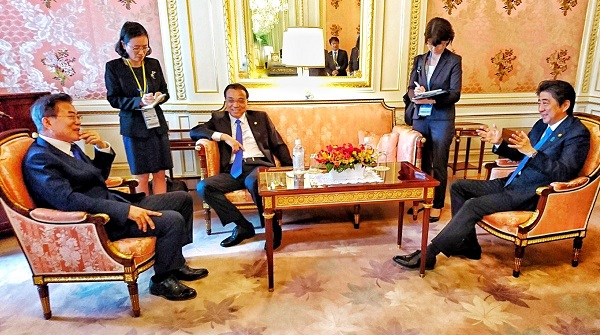

Follow us on:  
|


From right to left: Japanese Premier Shinzo Abe, Chinese Premier Li Keqiang and South Korean President Moon Jae-in in Tokyo, Japan on 9 May 2018 [Image: Prime Minister’s Office of Japan]
In Tokyo on Thursday, Li was quoted in a Xinhua report saying “lasting stable development should be made in China-Japan relationship as it returns to the normal track”.
On Thursday Li attended an event marking the 40th anniversary of the China-Japan peace treaty in Tokyo. Disputes over the two countries’ sensitive wartime history has impacted trade in recent years.
Chinese Premier Li and his Japanese counterpart Shinzo Abe have held multiple rounds of discussions this week on trade, bilateral ties and international issues including North Korea.
“China, Japan and South Korea have all benefited from free trade and are all advocates of free trade. Under the current circumstances, they should stand more firmly together for rules-based multilateral free trade system and against acts of trade protectionism and unilateralism,” Li said in a veiled dig at US President Donald Trump’s protectionist policies that, critics warn, is posing the biggest threat to the world economy this year.
China, Japan and South Korea began free trade agreement talks in November 2012, with the latest round of talks being held in Tokyo.
The three countries together have a market of 1.5 billion people.
Territorial and historical disputes as well as differing views on market access have considerably slowed down negotiations between the three nations.
Japan and South Korea have been involved in a prolonged row over the disputed islands known as Dokdo in South Korea and Takeshima in Japan.
Sino-Japanese ties have also been under strain due to a territorial dispute over another set of islands.
Both China and Japan have accused the other of flying military aircraft too close to its own jets in a long-running territorial dispute over a cluster of islets in the East China Sea, known in China as Diaoyu and in Japan as Senkaku, which has left ties between the two nations strained.
But leaders of the three Asian giants have attempted to forge closer ties amid unprecedented diplomatic moves in the region aimed at resolving the Korean crisis.
TBP and Agencies